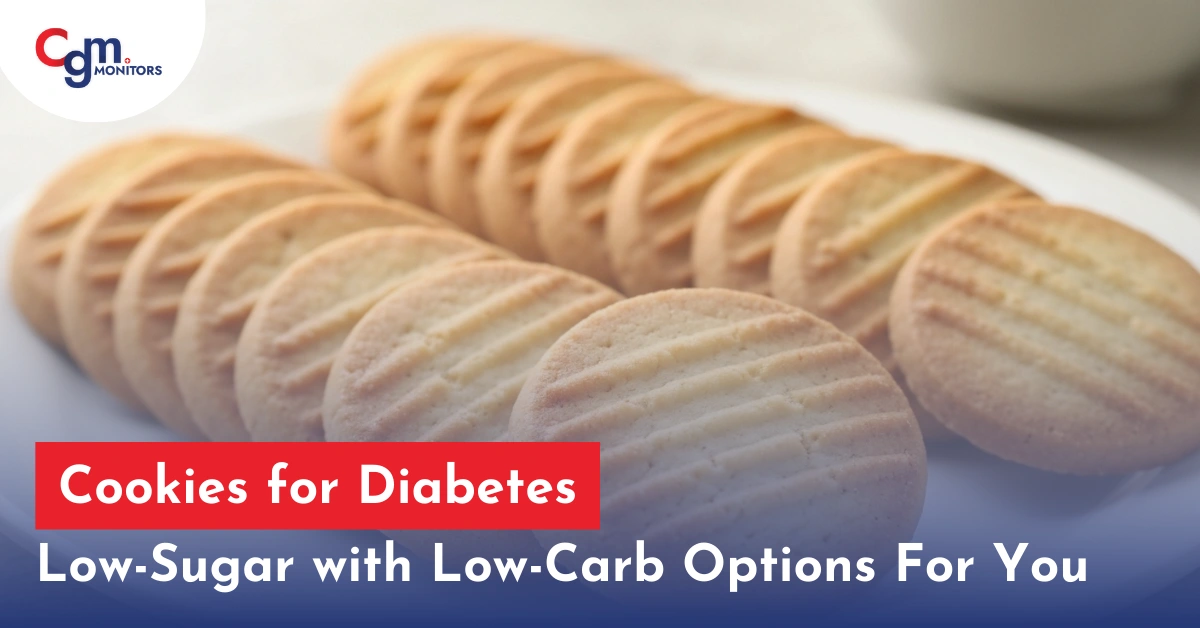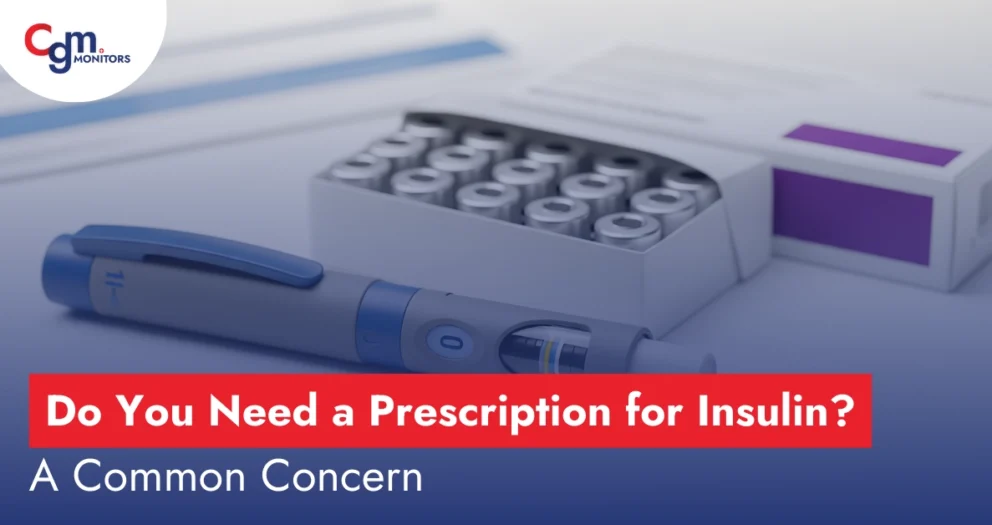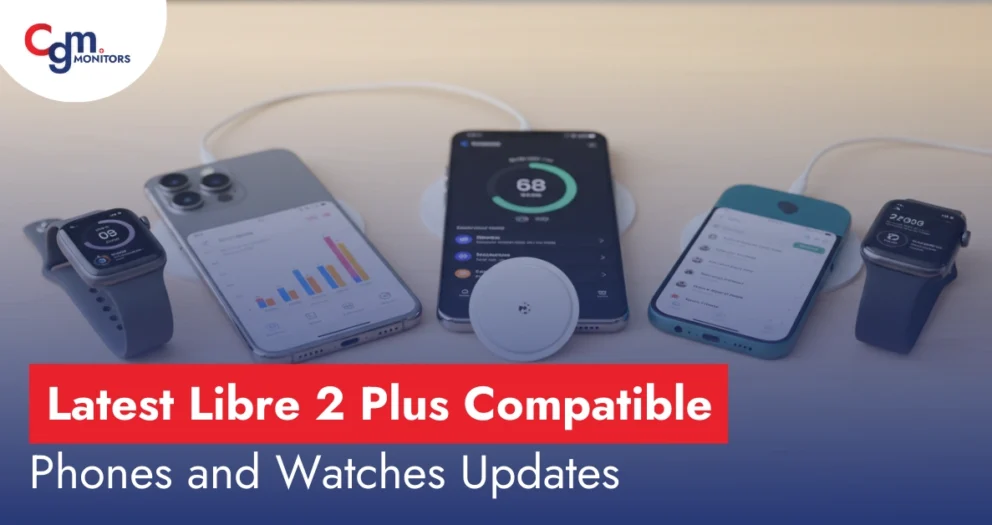Table of content
- Cookies for Diabetes: What are they?
- How Many Cookies Can a Diabetic Eat
- Best Ingredients for Diabetic Cookies
- How To Make Cookies for Diabetics People
- Ingredients to Avoid in Diabetic Cookies
- Low Sugar Cookies for Diabetics: Low GI Cookies
- Cookies for Gestational Diabetes: 3 Best Recipes
- Tips for Enjoying Cookies with Diabetes Without Guilt
- Conclusion
- People Asked For
For people living with or at risk for diabetes, managing sugar intake is a clinical necessity. You should know that cookies can fit into a diabetic diet, but it depends on the type and quantity you take.
We’ll cover what makes a cookie diabetic-friendly, including healthy ingredients, sugar alternatives, and strategies to reduce blood sugar spikes. For people who need to track their sugar level, try advanced tools like CGM monitors. Read this article and bake cookies for diabetes, but remember to track glucose levels in real-time while snacking..
Cookies for Diabetes: What are they?
Diabetic cookies don’t mean sugar-free cookies; they’re defined as “cookies with reduced sugar or sugar substitutes” that don’t spike blood sugar within minutes. They are safe to eat as long as they are baked with the right ingredients and in moderation. Even the American Diabetes Association (ADA) notes that portion-controlled desserts can fit into diabetes management.
How Many Cookies Can a Diabetic Eat
The number of cookies you can enjoy as a diabetic isn’t a one-size-fits-all. It depends on your specific diabetes type, blood sugar control, medication, activity level, and overall lifestyle and diet. In CGM Monitors’ expert point of view, moderation is key to avoiding spikes. Aim for treats that fit within 15-30g of carbs per snack, which might mean 1-2 average chocolate chip cookies (about 12-16g carbs each) occasionally. It is recommended to pair with protein, like nuts, to stabilise levels. Focus on low-sugar or homemade versions. Do not buy from the store or market without proper inspection, like glycemic index, etc.
Tools like CGM can help you track real-time glucose responses to specific treats. For a deeper understanding of what affects your readings, visit our blog: what level of blood sugar is dangerous?
Best Ingredients for Diabetic Cookies
| Ingredient Type | Recommended Options | Why It Matters |
| Flour Alternatives | Almond flour, coconut flour, oat flour, and whole wheat flour | Lower glycemic load and higher fiber |
| Sweeteners | Stevia, erythritol, xylitol, Splenda (e.g., in Splenda peanut butter cookies) | Best diabetic-friendly sugar substitutes |
| Fiber Sources | Flaxseed, chia seeds, oat bran, and coconut flour | Supports better insulin response |
| Protein Additions | Almond meal, sunflower seeds, natural nut butters | Supports satiety, reduces post-snack spikes in glucose |
| Fats | Nuts, seeds, avocado oil, olive oil | Healthy fats help buffer carbohydrate metabolism |
| Other Nutrient Boosters | Unsweetened cocoa, cinnamon, vanilla, shredded coconut (unsweetened) | Add flavor and antioxidants without sugar |
How To Make Cookies for Diabetics People
When preparing or selecting a sugar-free cookie recipe, the success of balanced glucose levels depends on ingredients (so does the taste!). Not all “healthy” cookies are diabetic-friendly, and misleading labels such as “organic cookie” or “low sugar” hide high-glycemic fillers or carbohydrates. First, understand what the terms even mean:
Low Carb, Low Sugar, Sugar-Free: What Do These Mean?
- Low carb: Usually under 15 g net carbs per serving to help blunt glucose spikes.
- Low sugar: Minimal added sugars, but still includes natural sugars (e.g., from oats).
- Sugar-free: No added sugar, but often uses sugar alcohols or sweeteners that still contribute carbs.
Ingredients to Avoid in Diabetic Cookies
| Avoid This | Why It Should Be Limited or Eliminated |
| Refined sugar | Causes high blood sugar due to a high glycemic index |
| White flour | Lacks fiber, digests quickly, and contributes to insulin resistance |
| Maltodextrin and corn syrup | Common in “sugar-free” labelled foods, but spikes glucose dramatically |
| Artificial fillers & binders | Affects gut health and glucose tolerance |
Low Sugar Cookies for Diabetics: Low GI Cookies
These options are designed for single-serving or duo-serving portions. Make sure to see calories, fiber, and carbohydrate count per portion. Check out recipe-ready overviews that combine taste with glycemic mindfulness.
1. Sugar-Free Sugar Cookies
- Total Time: 20 minutes
- Servings: 2
- Calories: 120
- Carbohydrates: 13g
- Fiber: 2g
- Sugar: 3g of sugar per serving
Enjoy this buttery and light cookie made with vanilla and almond extract. In this recipe, replace refined flour with almond flour and erythritol for sugar.
2. Chocolate Chip Cookies
- Total Time: 18 minutes
- Servings: 1
- Calories: 110
- Carbohydrates: 12g
- Fiber: 3g
- Sugar: 2g sugar per serving
It’s the best diabetic chocolate chip cookie recipe. Just use sugar-free chocolate chips and a blend of almond and coconut flour.
3. Peanut Butter Cookies
- Total Time: 15 minutes
- Servings: 1
- Calories: 105
- Carbohydrates: 10g
- Fiber: 2g
- Sugar: 1g sugar per serving
This peanut butter cookie sugar-free version uses only four ingredients, including peanut butter, Splenda, and one egg.
4. Oatmeal Cookies
- Total Time: 22 minutes
- Servings: 2
- Calories: 130
- Carbohydrates: 14g
- Fiber: 3g
- Sugar: 3g sugar per serving
Among top oatmeal cookie recipes (healthy, low sugar), these feature oat flour, cinnamon, and stevia, with optional flaxseed for fiber. You’ll have a Walmart-style oatmeal cookie.
5. No-Bake Cookies
- Total Time: 10 minutes
- Servings: 2
- Calories: 100
- Carbohydrates: 9g
- Fiber: 3g
- Sugar: 1g of sugar per serving
Part of no-bake and 4-ingredient diabetic cookie recipes, these require no oven, just nut butter, coconut, sweetener, and a pinch of salt.
Cookies for Gestational Diabetes: 3 Best Recipes
Yes, you can eat cookies during pregnancy, but it’s all about smarter choices that keep your blood sugar steady while satisfying those pregnancy cravings. Focus on low-carb recipes with high-fiber ingredients like almond flour, natural peanut butter, and sugar alternatives to minimize spikes.
Here are three easy, delicious cookie recipes adapted for GD-friendliness, each making about 8-12 cookies. They’re simple to bake in the oven at home and pair well with a protein source like cheese or nuts if needed for better balance.
1. Low-Carb Chocolate Chip Cookies
These chewy delights use ground almonds and wholemeal flour for fiber, with dark chocolate chips for lower sugar content—perfect for a cozy snack without derailing your levels.
Ingredients:
- 1 cup ground almonds (or fine almond flour)
- 1/2 cup wholemeal self-rising flour (or wholemeal flour + 1/2 tsp baking powder)
- 1/3 cup unsalted butter, softened
- 5 tbsp erythritol or xylitol sweetener
- 1 large egg, beaten
- 1 tsp vanilla extract
- 1/3 cup dark chocolate chips
- Pinch of salt (according to your desire)
Steps:
- Cream butter and sweetener until fluffy, then mix in beaten egg and vanilla.
- Stir in almonds, flour, salt, and chocolate chips to form a dough.
- Chill dough in freezer for 15 minutes (or fridge for 1-2 hours).
- Preheat oven to 350°F, roll dough into walnut-sized balls, flatten on a lined baking sheet.
- Bake 10 minutes until edges brown; cool on sheet for softness.
2. Soft Peanut Butter Cookies
Made with just four ingredients, these stay soft thanks to honey’s natural moisture (use sparingly for low glycemic impact), and peanut butter adds protein to help stabilize blood sugar.
Ingredients:
- 2/3 cup creamy natural peanut butter (no added sugar)
- 1 large egg
- 3 tbsp honey (or monk fruit sweetener for zero carbs)
- 1/4 tsp baking soda
Steps:
- Preheat oven to 350°F on lowest rack.
- Whisk egg, then mix in honey and baking soda.
- Stir in peanut butter until smooth (switch stirring directions if needed).
- Scoop 2-3 tbsp portions onto a sheet, flatten to 1/2-inch thick.
- Bake 10 minutes; cool completely on sheet.
Per cookie: ~9g net carbs, 5g protein—great for a quick, satisfying bite.
3. Ingredient Almond Cookies
Super simple and gluten-free, these rely on almond flour for nutty flavor and fiber, making them a blood sugar-friendly option that’s easy on your busy schedule.
Ingredients:
- 1 cup almond flour
- 2 tbsp allulose syrup (or erythritol-based maple alternative)
- 2 tbsp unsweetened almond milk
- Optional: Pinch salt, 1/4 tsp vanilla, sliced almonds for topping
Steps:
- Preheat oven to 350°F, line a baking sheet.
- Mix all ingredients into a dough ball (add options as desired).
- Roll into 1-tbsp balls, place on sheet, flatten gently, top with almonds.
- Bake 10-12 minutes until golden.
Low in carbs (~3-4g net per cookie) and refined-sugar-free—drizzle with melted dark chocolate for extra indulgence if your levels allow.
Tips for Enjoying Cookies with Diabetes Without Guilt
Here are some tips for people living with diabetes with sugar cravings. Keep only 3 of these in mind for stable sugar levels:
- Portion Control and Serving Size: Most sugar-free cookie recipes list nutrition per serving. Always read calories, carbs, and fiber per serving, and pair cookies with protein or fiber-rich meals to reduce glycemic load. This approach helps support both Type 1 and Type 2 diabetes management.
- Monitoring & Adjusting Cookie Intake: Using a CGM allows you to see how different desserts affect your glucose in real time. By tracking levels, you can safely enjoy diabetic cookies. Consider trusted tools like Freestyle Libre 3 Plus or Dexcom G7.
- Timing: Cookies are best enjoyed with meals, not on an empty stomach. Stop eating 2-3 hours before bedtime to avoid overnight glucose elevations.
Conclusion
Enjoying cookies for diabetes is entirely possible with the right knowledge, portion control, and mindful choices. Diabetes is a serious concern as millions worldwide have it, but online, it’s often connected with Americans. According to the statistics, over 53 million people are projected to be diagnosed by 2025 (all Americans, and that’s over a 64% rise since 2010). Instead of buying store cookies, bake sugar-free cookies and focus on high-fiber, low-glycemic ingredients. Additionally, consider wearing a CGM device to track and manage diabetes in real-time, allowing you to enjoy cookies without worry. Buy online today at CGM Monitors.
People Asked For
How do I make diabetes-friendly cookies at home?
To create homemade diabetes-friendly cookies, swap white flour for almond or coconut flour to lower carbs. Use natural sweeteners like stevia or monk fruit instead of sugar. Add nuts, seeds, or unsweetened cocoa for fiber, then bake at 325°F for 10–12 minutes. Always practice portion control and monitor blood sugar.
What are the best types of cookies for people with diabetes to eat?
Nut-based cookies like almond or peanut butter cookies with under 5g carbs per serving are ideal. Sugar-free chocolate chip cookies, coconut macaroons, or pumpkin seed cookies also work well when made with low-carb sweeteners.
What ingredients make a cookie diabetes-friendly?
Low-carb flours such as almond or coconut flour, healthy fats from nut butters or avocado, and fiber-rich add-ins like seeds or dark chocolate help stabilize blood sugar. Avoid refined sugars and processed flours.
Where are the best online stores to buy diabetic-friendly cookies?
Popular options include Amazon for sugar-free brands, Cheryl’s Cookies for flavored varieties, ChipMonk Baking for keto options under 4g carbs, and Walmart or Target for affordable store-brand selections.
Why do regular cookies cause blood sugar spikes in diabetics?
Regular cookies contain refined sugars and simple carbs that digest quickly, causing rapid glucose spikes. With little fiber or protein to slow absorption, blood sugar rises sharply.
When is the best time for a diabetic to eat a cookie?
The best time is after a balanced meal with protein, fats, and vegetables. This slows sugar absorption and reduces spikes. Avoid eating cookies alone or late at night.
Why should diabetics be careful about eating regular cookies?
Regular cookies are high in refined carbs and sugars that rapidly raise blood glucose. Even lean diabetics are affected, so moderation or low-GI alternatives are essential.
What are some common sugar substitutes used in diabetic cookies?
Common substitutes include stevia, monk fruit extract, erythritol, allulose, and Splenda. These sweeteners provide flavor with minimal impact on blood sugar.
How can I reduce the carbohydrate content in cookie recipes?
Replace wheat flour with almond flour or oat fiber, use sugar-free chips, and add fiber sources like chia seeds or flaxmeal. Reducing carb-heavy ingredients helps control glucose spikes.







Write a comment
Your email address will not be published. All fields are required